PM ‘deeply concerned’ over Turkey strikes on Kurd forces
Scott Morrison and Marise Payne are ‘deeply troubled’ by Turkey’s attack on Kurdish troops.
Scott Morrison and Foreign Minister Marise Payne have said they are “deeply troubled” by Turkey’s invasion of northeastern Syria, saying the decision could have “grave consequences” for the region’s security.
Turkey began its invasion of northeastern Syria early on Thursday (AEDT), launching a large scale air strike and ground offensive against Kurdish targets. President Recep Tayyip Erdogan tweeted that Operation Peace Spring would prevent a “terror corridor’’ along the Turkish border.
In a joint statement the Prime Minister and Senator Payne said they held concerns the move could lead to the resurgence of Islamic State, while revealing they been in direct contact with both Ankara and Washington to express these worries.
“Actions of this nature will have grave consequences for regional security and could significantly undermine the gains made by the international coalition in its fight against Da’esh, which remains a serious threat to regional peace and security despite its territorial defeat,” they said.
“It will cause additional civilian suffering, lead to greater population displacement, and further inhibit humanitarian access.”
“While Turkey has legitimate domestic security concerns, unilateral cross-border military action will not solve these concerns. We have expressed this view directly to the Turkish Government.”
Mr Morrison and Senator Payne both called for a de-escalation in tensions.
“We urge restraint and call on all parties to the conflict in Syria to avoid escalatory or opportunistic actions that cause further instability and humanitarian suffering,” they said. “The Australian Government notes that the Syrian Democratic Forces (SDF) have been steadfast partners for the international Coalition in the fight against Da’esh, and have borne a significant share of the sacrifice.”
Earlier, Mr Morrison defended Donald Trump’s decision on Monday to withdraw US troops from northern Syria, which left the Kurds isolated and open to Turkey’s attack.
“The decision of the United States is a matter for them. It’s a sovereign position of the United States,” Mr Morrison said. “It’s not for me to run a commentary. They are their troops deployed by the US government, not by Australia or anyone else and the US has been doing the lion’s share of the lifting when it has come to the efforts in the Middle East.
“As I said yesterday it’s a statement of fact and not the a statement of commentary this decision is consistent with statements the President has been making for some time.”
Mr Morrison reiterated it was Turkey’s actions that concerned him and had led to the ratcheting-up of tensions.
“Let’s be clear it’s the Turkish government that is taking action here to create an unstable situation, they’re the ones who are actually deploying and seeking to walk across the border and to take actions in another nation state,” Mr Morrison said.
“It is Turkish government’s doing that and it’s the actions of the Turkish government that concern Australia very seriously.”
Turkish onslaught begins
The Turkish onslaught began with fighter jets striking Res al-Ain, a Syrian border town controlled by Kurdish-led Syrian Democratic Forces. Some hours later, Turkish officials said troops had entered the area “east of the Euphrates.”
The ground assault was launched in the border town of Tal Abad, with Turkish media reporting special forces and armoured vehicles had entered Syria at several points along the border.
A source from the Serekanyie Military Council told the North Press Agency the Turkish army had targeted 16 points with air strikes and heavy artillery shelling, in the villages of Aluk, Nustel, Aziziya, Aziziya school, Bir Nouh, Asadiya, Musharrafa and silos in Ras al-Ain.
At least eight civilians and seven Kurdish fighters were killed, mostly in cross-border artillery fire, in various locations along the border, including in the city of Qamishli.
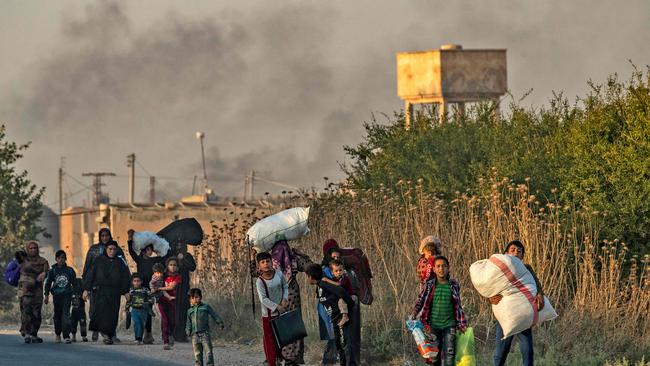
Pictures on Turkish television showed plumes of smoke rising over Ras al-Ain, as well as jets taking off from the military base at Diyarbakir, the de facto capital of Turkey’s Kurdish region
The strikes also hit one of the several Kurdish camps near the border where Islamic State prisoners are being held.
Coalition countries have grave concerns the Kurds will now abandon the internment camps, including the infamous 70,000 strong Al-Hawl camp where 66 Australian women and children are housed, in order to fight back against Turkey.
Australia expressed “deep and profound” concerns about the invastion, but senior federal government minister Greg Hunt refused to be drawn on whether the Turkish offensive into Syria could lead to the return of Islamic State.
“We have deep and profound concerns,” Mr Hunt told ABC Radio on Thursday.
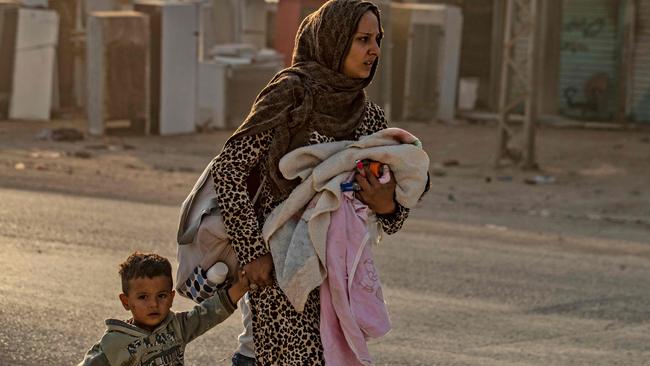
In recent days Al-Hawl has seen women and children starting fires and attacking guards, a Kurdish official said. Mahmoud Kro, an official who oversees the internment camps told Middle East Eye that the Al-Hawl camp was chaotic, with detainees preparing explosive devices as well as attacking officials.
“There are attacks on guards and camp management, in addition to burning tents and preparing explosive devices,” said Mr Kro, speaking from the town of Qamishli.
“In terms of preparations, our first priority is protecting our region and existence,” he said. “The Turks are targeting our existence as Kurds to the first degree.”
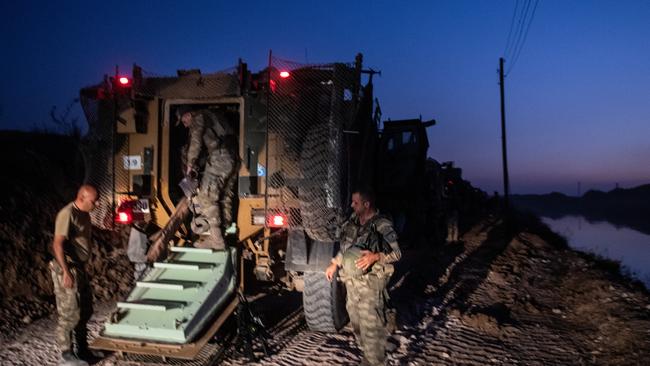
One woman at Al-Hawl told family members in Australia trenches have been dug and water and food supplies have dropped.
Kamalle Dabboussy, who has been leading the efforts to bring the Australians home, said a woman inside the camp asked him this morning how long they could survive without water, as supplies have fallen since Turkey launched its invasion into northern Syria.
The woman said trenches have been dug “around us”.
Mr Dabboussy said the Australian women have been taking turns to guard their tents in case of any violence emerges within the camp.
The woman who messaged him said they felt Australia has been “ignoring us” and they have great fears for their safety.
Late Wednesday the Kurds indicated their priority was fighting Turkish forces rather than guarding the camps, as they began moving their forces into North East Syria.
Donald Trump, whose surprise withdrawal of US troops on Monday left the Kurds isolated, said the Turkey attack was “a bad idea”. He said the United States would hold Turkey to their promise to protect civilians and avoid a humanitarian disaster.
He added Turkey was “now responsible for ensuring all ISIS fighters being held captive remain in prison and that ISIS does not reconstitute in any way, shape, or form.”
But a senior adviser to Mr Erdogan told CNN the management of the camps had to be undertaken as a joint effort with the international community.
The advisor, Gülnur Aybet said. “We will safeguard any areas that contain these prisons. However, we would like the management of the camps, in particular, something that has to be undertaken as a joint effort with the international community.
“We never said we would shoulder this burden all by ourselves.”
Hêmin Kobanê, an SDF representative, claimed Turkey had already departed from its stated aims of a limited operation.
Turkey says it wants to clear a 30km wide corridor in Northern Syria along its border to be able to repatriate two million of its 3.6m Syrian refugees and create a buffer with the Kurds in the north-east of Syria.
But Mr Kobane said what going on ground “is far away from Turkish speech’’.
He said Turkish air strikes were hitting targets as deep as 40km inside Syria and along the border for 600km. He said jihadists were gathering outside the border towns of Res Al Ain and Tal Abyad and planning to launch attacks.
Ankara has been fighting a Kurdish insurgency in the country’s south for 35 years and are determined its autonomous ambitions won’t succeed.
Turkey also targeted Tal Abyad city and the eastern villages, Al-Yabisah, Tal Fender, Derobiya, Badeea and Mashta Al-Aza and around the Soluk area on Wednesday.
Syrian photographer Baderkhan Ahmed reported that after Qamishli was attacked, hundreds of people have massed onto the streets protesting.
There was also reports of heavy gunfire between the SDF forces and Turkish military in the village of Tal Ziwan in Darbasiyah, northeastern Syria.
European Commission President Jean-Claude Juncker told EU MPs on Wednesday: “I call on Turkey as well as on the other actors to act with restraint and to stop operations already, as we are speaking, underway.” While acknowledging that Turkey has security concerns on its border with Syria, Mr Juncker said that “if the Turkish plan involves the creation of a so-called safe zone, don’t expect the European Union to pay for any of it.”
The EU is paying Turkey 6 billion euros ($A9.79bn) to help the country cope with almost 4m Syrian refugees on its territory in exchange for stopping migrants leaving for Europe. But Ankara is seeking more money amid concerns that thousands of Syrians could soon cross its border.
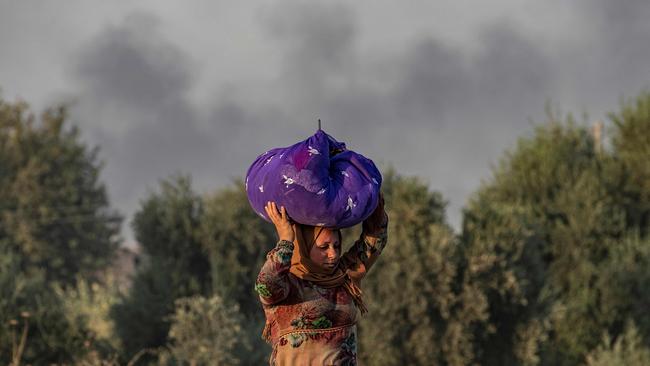
Kurdish forces redeployed
Earlier, Kurdish forces guarding Syrian camps holding tens of thousands of Islamic State suspects were being redeployed after Donald Trump’s shock decision to pull US troops out of the area.
The Syrian Democratic Forces (SDF), the West’s key ally against Islamic State, is shutting down units that secure prisons and camps in northeastern Syria holding as many as 100,000 suspected ISIS members and their wives, including 64 Australian women and children. The fighters are to be sent to the border to prepare for a Turkish attack.
The move raises the threat of a major breakout from prisons that are already overcrowded, understaffed and blighted by riots and violence.
It underlines how the US President’s abrupt announcement, which surprised US allies and Republicans in Washington, threatens to reignite Syria’s eight-year war.
Mr Trump appeared to row back in the face of withering Republican criticism that he was abandoning the Syrian Kurds to an assault by Turkish forces that have massed on the border.
He said on Wednesday AEDT “in no way have we abandoned the Kurds, who are special people and wonderful fighters”.
They would continue to receive US funds and weaponry.
He also tried to bolster relations with Turkey after his warnings the day before that he would “obliterate” the country’s economy if it did anything “off limits”. He said the US relationship with Turkey, “a NATO and trading partner, has been very good”, and he would meet Turkish President Recep Tayyip Erdogan in Washington on November 13.
Turkish Vice-President Fuat Oktay said Ankara would “determine our own path” and “set our own limits”.
General Mazloum Kobani Abdi, commander of the Kurdish-dominated SDF, said guarding ISIS prisons had become a “second priority” for his fighters, many of whom have families in border towns that would fall on the frontline should Turkey attack.
Istanbul sent more armoured vehicles to the border with Syria on Wednesday, with a large convoy of dozens of vehicles seen in the Turkish town of Akcakale in Sanliurfa province. Its military said it had completed all preparations for a cross-border offensive.
The incursion aims to clear Kurdish fighters from a strip of border territory running east of the Euphrates River to the border with Iraq. Turkey says once secured, the area would become a “safe zone” allowing the repatriation of about two million of the Syrian refugees now on Turkish soil.
ISIS prisoners have already tried to break out of the largest jail in the region, with guards last week forced to retreat from the wing before regaining control.
Riots have also broken out in al-Hawl camp, where more than 70,000 suspected ISIS wives and children, including the Australians, are being held.
Abdulkarim Omar, a foreign relations official with the Kurdish administration, described al-Hawl in particular as “a time bomb”.
“We have defeated Daesh (ISIS) militarily and geographically, but it is still there with its sleeper cells and ideology,’’ he said.
“When we have to evacuate these areas, it’s going to be a good chance for Daesh to reorganise itself and take control over swaths of Syria and Iraq. The international community and the international coalition should bear responsibility for this, otherwise they’ll have to bear the consequences.”
However, there were signs on the ground that the US pullout, and Turkish operations, may be more limited than Ankara had hoped. It could be restricted only to the border town of Tal Abyad, which is Arab-majority. Although about 50 US troops have been withdrawn from Tal Abyad, where joint US-Turkish patrols had started last month, hundreds more remain within 30km of the border.
The Syrian Observatory for Human Rights reported that the US-led coalition was continuing to ship equipment into the region despite Mr Trump’s insistence that troops would be pulling back.
Witnesses reported about 80 trucks, including military vehicles, crossing into Kurdish-controlled northeastern Syria from Iraq on Wednesday.
Additional reporting: Mark Schliebs

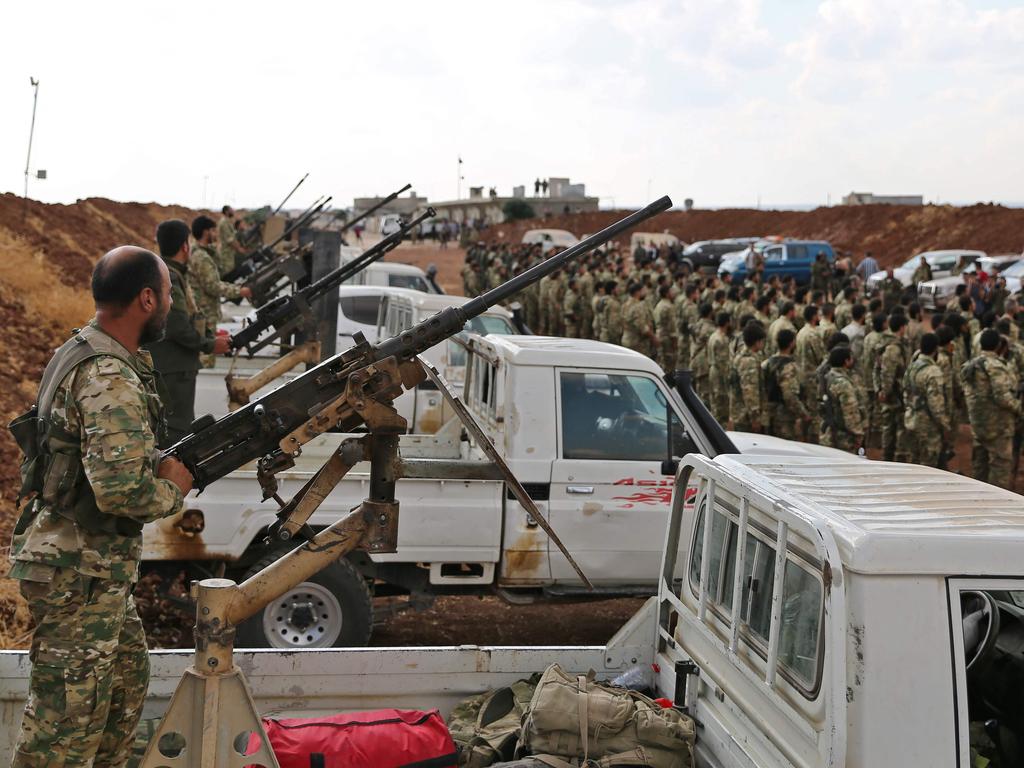


To join the conversation, please log in. Don't have an account? Register
Join the conversation, you are commenting as Logout